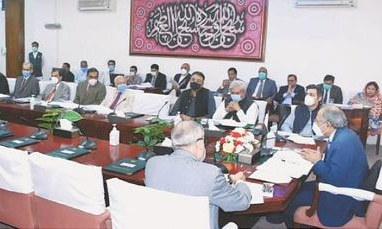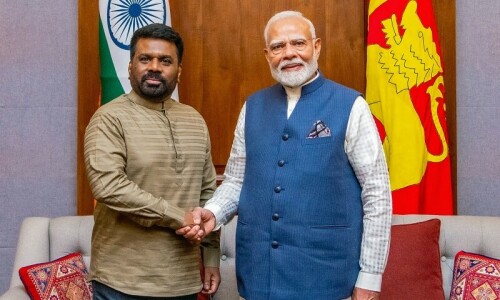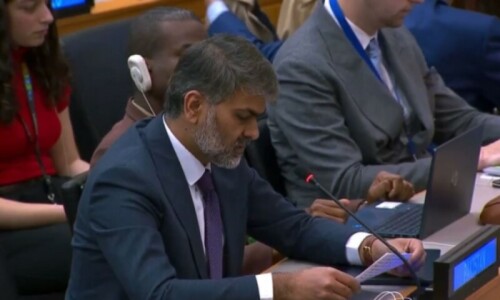ISLAMABAD: The government is considering an end to expansion of gas pipeline network for residential consumers, conversion of all coastal independent power plants (IPPs) on furnace oil to water desalination plants and exemption of all energy sector investments from the scope of the National Accountability Bureau (NAB).
This is part of a broad energy sector reform plan currently being finalised by the relevant ministries after a series of presentations to Prime Minister Imran Khan.
The prime minister has been told in unequivocal terms that the broadside against investors is the single most detrimental aspect to investment — meaning little success towards management contracts for turnaround of state- owned entities (SOEs) and thus ultimate privatisation. On this, the prime minister has not yet decided whether to push ahead with his desire for forensic audit of all IPPs.
For success in energy sector reforms either through outsourcing of certain functions or businesses or public-private partnership, the government would have to address two investor requirements. It is examining if one or both houses of the parliament and the Supreme Court can ratify any of the proposed arrangement before its formal roll out and to indemnify through law the “incoming investors/operators against NAB-type retrospective inquiries except for any unethical or illegal acts of commission or omission going forward”.
Under the plan, all coastal furnace oil-fired power plants are being considered to be used for sea water reverse osmosis desalination in IPP or build, operation, own and transfer mode. Hubco is reported to have already considered such a possibility and discussed it with the authorities.
The power purchase agreement of Hubco’s 1200MW old plant set up before 1994 power policy can be converted into a 300-600 MIGD (million imperial gallons per day) water purchase agreement with the Karachi Water and Sewerage Board backstopped by government guarantee as an exception to the rule given its pioneer status at an indicative tariff of 50 paisa per gallon.
For improving the power SOEs, the authorities are considering to offer them to private sector through a competitive bid for 5-7 years’ management contract under public private partnership. This will be based on a percentage sharing (ideally 80:20) of efficiency gain but without any upfront equity offering for outright privatisation.
There would be no employee layoff except under voluntary separation scheme in selected cases.
The Privatisation Commission would be mandated to lead this time-bound initiative to induct local or foreign operator or manager to provide management and technical expertise, invest a certain amount over the years against a mutually agreed business plan for loss reduction and increased revenue.
Its returns would be a defined percentage of the agreed reduction in the operational (EBITDA-earning before interest, taxes, depreciation and amortisation) losses each year against a baseline number. For example, if a company is suffering a Rs100 million loss a year and the contractor reduces it to Rs90m, it would be entitled to a 20pc (Rs2m) and the government would save Rs8m it would have otherwise paid out of budget or tariff increase.
Under the plan, the two gas utilities – the SNGPL and the SSGC – would be unbundled into a federal government- owned transmission company on the pattern of the power transmission company and at least four provincial government-owned gas distribution companies like power distribution companies.
It would be the responsibility of each provincial government to account for and reduce the unaccounted-for-gas and other losses going forward. The plan also seeks to maintain blanket ban on new imported fuel (i.e. RLNG and coal) based power projects and instead facilitate and expedite maximum production at Thar to bring down the per tonne cost of this indigenous lignite and resultant power tariff from Rs10 per unit to Rs5 per unit in subsequent phases.
A new incentive structure under the existing Exploration and Production Policy is under consideration to enhance local production of oil and gas over the long term and simultaneously sort out through the Council of Common Interests the natural gas (indigenous and imported) weighted average cost of gas formula.
There would be no incremental pipeline gas for the domestic sector to be replaced by local or imported liquefied petroleum gas (LPG) with targeted subsidy to the poor population segment via Ehsaas/BISP-type cash transfer programmes.
At present, about three million applications are pending for domestic gas connections while the gas utilities can provide a maximum of 400,000 connections a year. The demand has to be curbed for a commodity which is no more available.
All power transmission projects would be financed under the public-private partnership mode under open access policy with funding from yield co investors on the pattern of shared telecom tower infrastructure business model.
As part of the holistic downstream petroleum sector pricing reforms, all local oil refineries would be required to individually or jointly finance themselves without any further government incentive or protection and commission a cracking unit to convert their residual furnace oil into petrol and diesel.
Also, all government-owned power generation companies, not earmarked for retirement, would be auctioned for operation and management contracts to private sector under an improvement-sharing payment structure.
Overtime, the downstream refined petroleum sector pricing reforms would include full deregulation of consumer pricing of all remaining refined petroleum products like diesel and petrol.
Published in Dawn, October 19th, 2020














































